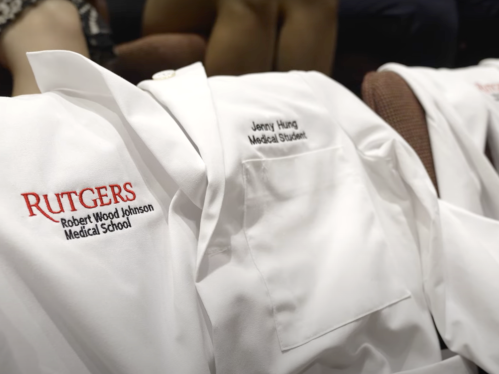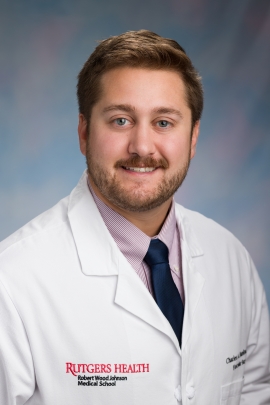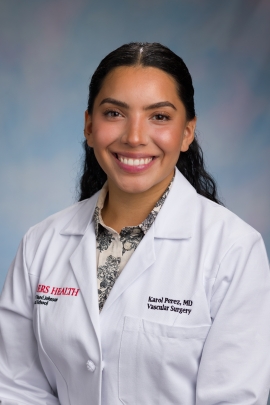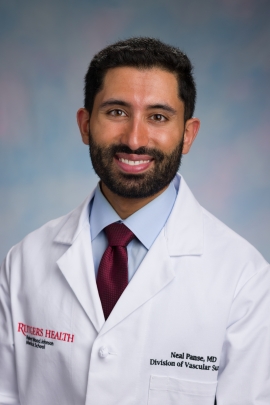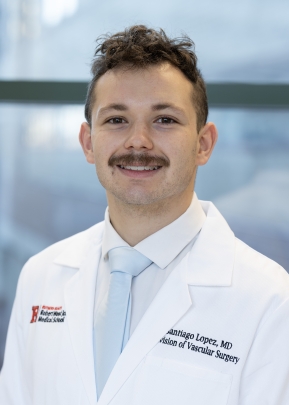Vascular Surgery Integrated Residency
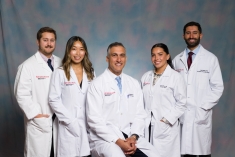
Overview of the Program
Robert Wood Johnson Medical School has been accredited as a training program in vascular surgery since 1984 without reservations by the Residency Review Committee and the ACGME. Initially offering a fellowship in vascular surgery, we now have a vascular surgery integrated residency as the sole training paradigm at RWJMS. The vast majority of training will be with Robert Wood Johnson faculty at Robert Wood Johnson University Hospital in New Brunswick, New Jersey, the flagship of RWJBarnabas Health.
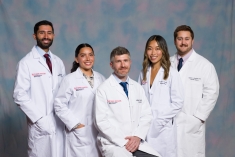
Our residency in Vascular Surgery is designed to provide a comprehensive experience in the care of patients with vascular disorders. The breadth and depth of training available at our institution will allow our graduating residents to pursue either an academic or private practice career pathway. The trainee will experience intense specialty training designed to provide a comprehensive experience in the management and treatment of all forms of vascular disease. Our goal is to create competent vascular specialists that can independently provide medical and surgical management for all vascular disease processes. Upon completion of training our residents should be able to effectively address even the most complex vascular disorders.
The Vascular Integrated Residency Program operates under the direction of Program Director, William Beckerman MD, FSVS, FACS, RPVI and Chief, Saum Rahimi, MD, FSVS, FACS. Dr. Rahimi has been a faculty member of the Division of Vascular Surgery and Endovascular Therapy at Rutgers Robert Wood Johnson Medical School for his entire career following his training at Albany Medical Center. In addition to his role as Chief, Dr Rahimi also serves as the Norman and Ruth H. Rosenberg Chair in Vascular Surgery. Dr. Beckerman is a graduate of Robert Wood Johnson Medical School and completed his training via the Vascular Surgery Integrated Residency Program at Mount Sinai Hospital in New York, NY.
Accordion Content
-
The ACGME, RRC, and the ABVS have outlined a core vascular curriculum for trainees. These core areas are addressed through a weekly didactic lecture series. Weekly conferences include case presentation conferences, morbidity and mortality conferences, journal clubs, vascular lab conferences, basic science lectures, and endovascular conferences.
In addition, the residents will learn how to perform and interpret all non-invasive vascular laboratory tests. The volume of testing is quite extensive and upon completion of the program the fellows will have enough experience to easily obtain the required RPVI certificate required by the American Board of Vascular Surgery.
_________________________________________
The Division of Vascular Surgery provides education verification services for physicians who have completed our residency training program.
Cost: $100.00 per verification
Payment may be sent by check along with a signed release from the physician who is being verified.Mail payment to:
Rutgers Robert Wood Johnson Medical School
Urology Residency Training Program
Attn: Theresa A. Couzo, C-TAGME
125 Paterson St., MEB 527
New Brunswick, NJ 08901 -
Both open surgical and endovascular skills are acquired during the residency. All procedures are performed under the direct supervision of our faculty members, and almost all are performed in the operating room environment. No training is outsourced to interventional radiologists or surgeons at other facilities. Diagnostic and therapeutic minimally invasive interventional procedures including dialysis access revisions, carotid, renal and peripheral angioplasty, and endovascular aneurysm repairs are all performed in our state-of-the-art hybrid interventional suite at Robert Wood Johnson University Hospital. There is also an excellent balance of traditional open vascular reconstructions, including aortic, carotid and lower extremity reconstructions. Our large volume center allows our trainees to gain more clinical and operative experience than most residents at other training centers.
Our residents are trained to treat both medically and surgically all aspects of vascular disease; including carotid, aortic, thoracic outlet, renal, visceral, infra-inguinal, venous, lymphatic, dialysis access pathology and vascular trauma. Endovascular interventions include angioplasty and stenting of arterial, venous and dialysis access beds, deployment of branched, fenestrated and complex endografts, mechanical and pharmacological thrombolysis, inferior vena cava filter placement and retrieval through fluoroscopic imaging or use of intravascular ultrasound, duplex guided thrombin injection, and office based interventions, (e.g., vein ablation, sclerotherapy, and even some hemodialysis access procedures). Our volume of open procedures remains one of the highest in the country and includes complex redo open procedures.
-
The integrated residency in vascular surgery is a five-year (0+5) training program leading to eligibility for certification by the Vascular Surgery Board of the American Board of Surgery. The program accepts one resident per year. Applicants must participate in the National Residency Match Program (NRMP), applying in their final year of medical school. This five-year vascular surgery residency is accredited by the Accreditation Council for Graduate Medical Education (ACGME), and leads to board certification in vascular surgery.
In the first 3 years of training, 18 months are devoted to core surgical training, with 6 months of vascular related rotations, and 1 year of vascular rotations. Core Surgery includes trauma, general surgery, colorectal surgery, skin, soft tissue, and endocrine surgery, and transplant surgery. Vascular related rotations include Vascular lab, research, venous surgery, and radiology. The vascular rotations in the first three years create the building blocks for the final two years devoted solely to vascular surgery training. Residents will be prepared to sit for the RPVI exam by the end of the PGY-3 year. Candidates will be eligible for board certification in vascular surgery upon successful completion of training.
Several factors have made integrated residencies in vascular surgery a desired option, including the shortened training timeline compared to completion of a fellowship after general surgery residency and earlier time to focus on mastery of complex endovascular techniques. Advances in technology and changes in clinical care have increased the distinction between general and vascular surgery. The integrated residency allows trainees to learn advanced imaging and interventional skills earlier and with a great deal of in-depth appreciation for the newest technology.
Although the month-to-month curriculum is constantly evolving as we solicit feedback from all our trainees, a sample curriculum is as follows:
PGY1:
- Vascular Surgery: 6 months
- General Surgery: 2 months
- Trauma Surgery: 1 month
- Acute Care Surgery: 1 month
- Colorectal Surgery: 1 month
- Thoracic Surgery: 1 month
PGY2:
- Vascular Surgery: 6 months
- Thoracic Surgery: 2 months
- Surgical Critical Care: 2 months
- Plastic Surgery: 1 month
- General Surgery: 1 month
PGY3:
- Cardiac Surgery: 4 months
- General/Vascular: Highland Park: 3 months
- Outpatient Vascular Surgery/Vascular Lab: 2 months
- Transplant Surgery: 2 months
- Surgical Critical Care: 1 month
PGY4:
Vascular Surgery: 12 months
PGY5:
Vascular Surgery: 12 months
Contact Us
Theresa A. Couzo, C-TAGME
Vascular Surgery Residency Program Coordinator
Division of Vascular Surgery
One Robert Wood Johnson Place
Medical Education Building 527
New Brunswick, NJ 08901
Phone: 732-235-6813 Fax: 732-235-6042
Email: couzota@rwjms.rutgers.edu
William Beckerman, MD, FSVS, FACS
Vascular Surgery Residency Program Director
Associate Professor of Surgery
Division of Vascular Surgery and Endovascular Therapy
One Robert Wood Johnson Place
Medical Education Building, Room 543
New Brunswick, NJ 08901
Email: beckerwe@rwjms.rutgers.edu
